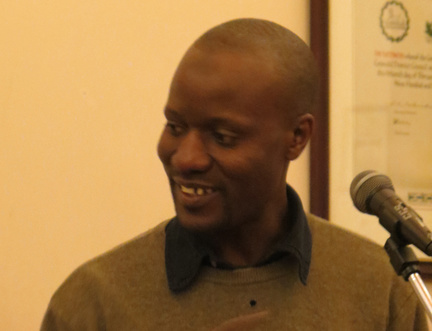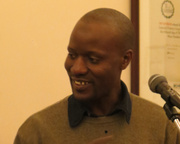The Freedom I Sought
By Hasani Hasani

In 2018, we commissioned 51 authors from 25 countries to write essays exploring ideas about freedom for The Freedom Papers, a publication produced in partnership with Gutter Magazine. Read on for Hasani Hasani's essay, and visit guttermag.co.uk to purchase a copy of The Freedom Papers.
I stand at the back of the queue, thinking, ‘When will this ever end?’ The more I think about it, the more hopeless I feel. And, as hope fades fear creeps in. The fear of being deported to my tormentors. Each step brings me nearer the door of the immigration reporting centre for asylum seekers and immigrants. Ah yes! Asylum seeker, that deplorable word which is spoken in hushed tones.
I was only one of hundreds of other people waiting in the drizzle outside Beckett House along St Thomas Street, London Bridge. As an asylum seeker running away from an evil political system that strips citizens of their freedom, I thought I had reached the land of the free. Hope is dashed the minute you realise that you have to convince the ‘authorities’ that you are worthy of the freedom that you yearn for. It is a battle that you plunge into, fighting an invisible enemy whose weapons against you are statutes that are hard to understand – ‘Immigration Act, 1971’.
As I near the entrance to the building, that’s when the heart begins to beat faster. Try as you may to put on a brave face, your eyes have a way of betraying the fear that you try to hide behind a fake smile. You cannot help but be fearful. In bold letters, on the letter you hand over the counter to the immigration officer is written, Notification of temporary admission to a person who is liable to be detained. That single sentence served as a noisome reminder that I was not free.
I thought I had run to freedom. But this was not the freedom I expected or even desired. Yes, I was free to say what I liked without fear of imprisonment. Where I had come from, freedom of speech was guaranteed on paper only; in reality, there was always a price to be paid for speaking out. I disliked that. One could not speak one’s mind without attracting the wrath of the law. And the wrath of the law was used on partisan lines. It was hard even to discuss simple everyday economic issues, like the haphazard increases in bus fares imposed on poor citizens on a daily basis. Fares for the same distance depended on the time of day it was. Mornings had different fares, so did afternoons and evening times. Even to discuss such hardships amounted to treason.
I was surprised at the tolerance exercised on these shores. At Trafalgar Square I had seen many people demonstrating and criticising the government openly, without fear of the police raining tear gas on them. Even the political discussions aired on radio and TV stations without the usual bootlicking of the sitting government and its ministers were quite a shock. I was used to the same old dreary reporting of our infallible rulers. They never made mistakes. Or, if they did, it was someone else’s fault. There was never acceptance of failure. This is why there was no freedom of speech. If there had been that freedom to ask pertinent questions, their incompetency would be exposed.
As the immigration officer handed back my paper indicating that my name had been ticked off for another week in the UK, a split-second flashback took me to where I had fled. I had spent the weekend in the cells, where security agents had enjoyed all kinds of ways to torment me and my friends. It was at the counter there, after what seemed like an eternity in foetid, dark cells that I was made to sign an ‘admission of guilt’ and pay a fine for ‘public violence’. The powerlessness I felt then, standing behind the counter is the powerless I feel now, before the immigration officer. At least now, there are no beatings or forced singing of songs with repellent lyrics. A better devil, maybe.
The freedom I yearned for was not only to speak my mind without fear of nocturnal visits from security agents with their millions of questions. I yearned for freedom from fear. Living in fear of being fired from my job because of political affiliation, fear of perpetual beatings by the police for the same reason. But unlike Nelson Mandela, who declared that freedom was an ideal he was prepared to die for, I was a coward. I left.
The words on my reporting papers, ‘You are a person who is liable to be detained’ only made my fight feel more hopeless. I could not believe that I had gone through all I had, abandoned my family and all I knew, and still not escaped fully what I feared most: detention. Only this time the warning was in black and white, whereas back home the propaganda machine ran twenty-four hours a day to deny its practices to the world. But even here there was a kind of imprisonment, in the directive that ‘I must reside at the address shown at X above’; that removed all pretense of actual freedom – even had I had money to go elsewhere. The asylum service was graciously allowing me, on a week by week basis, temporary respite from torture back home, but they gave me no money at all. Luckily, at the address on the paper, I had a cousin who despite having little himself had opened his home to me.
My heart stopped pounding when I got on bus 133 to Brixton. I felt safe away from the immigration centre. I thought they would have called me back before I even reached the bus. At Brixton Station, I got off the bus and went to the library. It was in the library that I found some peace of mind and comfort from the turmoil going through my mind. In the library I went straight to the shelf of biographies and I picked up Nelson Mandela’s tome, Long Walk to Freedom. I wanted to hear the voice of a true freedom fighter, and the voice urged me on.
Copyright © 2018, Hasani Hasani. All rights reserved.
Supported by the Scottish Government’s Edinburgh Festivals Expo Fund through Creative Scotland.
Look, Listen & Read
- 2026 Festival:
- 15-30 August
Latest News
 Major new partnership with Celtic Connections
Major new partnership with Celtic Connections




